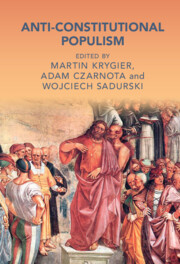Book contents
- Anti-Constitutional Populism
- Cambridge Studies in Law and Society
- Anti-Constitutional Populism
- Copyright page
- Contents
- Figures
- Contributors
- Acknowledgements
- Introduction: Anti-Constitutional Populism
- I Populisms
- Chapter 1 Populist Constitutionalism – Between Democracy and Authoritarianism
- Chapter 2 Anti-elitism and the Constitution – Some Reflections on Populist Constitutionalism
- Chapter 3 Constitutional Populism in South Africa
- Chapter 4 Subaltern Populism – Dutertismo and the War on Constitutional Democracy
- II Courts
- III Anti-Constitutionalism After Post-Communism
- IV Eu Responses
- V Concluding Reflections
- Index
- Cambridge Studies in Law and Society
- References
Chapter 4 - Subaltern Populism – Dutertismo and the War on Constitutional Democracy
from I - Populisms
Published online by Cambridge University Press: 24 March 2022
- Anti-Constitutional Populism
- Cambridge Studies in Law and Society
- Anti-Constitutional Populism
- Copyright page
- Contents
- Figures
- Contributors
- Acknowledgements
- Introduction: Anti-Constitutional Populism
- I Populisms
- Chapter 1 Populist Constitutionalism – Between Democracy and Authoritarianism
- Chapter 2 Anti-elitism and the Constitution – Some Reflections on Populist Constitutionalism
- Chapter 3 Constitutional Populism in South Africa
- Chapter 4 Subaltern Populism – Dutertismo and the War on Constitutional Democracy
- II Courts
- III Anti-Constitutionalism After Post-Communism
- IV Eu Responses
- V Concluding Reflections
- Index
- Cambridge Studies in Law and Society
- References
Summary
In arguably his most political novel, Demons,1 Russian novelist Fyodor Dostoyevsky warned that in ‘turbulent times of upheaval or transition low characters always come to the front everywhere’. Throughout his works, but most especially in this book, Dostoyevsky was absorbed by the perils of disruptive change in the ruins of a crumbling Czarist regime, as radicals and hardliners sought to establish a brave new world in a rapidly modernising yet tempestuous milieu. Quite presciently, he foresaw the dangers of what Italian thinker Antonio Gramsci, writing half a century later, most famously described as an impossible situation whereby ‘the old [order] is dying and the new cannot be born,’ thus ‘in this interregnum, a great variety of morbid symptoms [begin to] appear’. Confronting the advent of European fascism, Gramsci warned of ‘incurable structural contradictions [that] have revealed themselves’, with mainstream ‘political forces … struggling to conserve and defend the existing structure’.2
- Type
- Chapter
- Information
- Anti-Constitutional Populism , pp. 138 - 182Publisher: Cambridge University PressPrint publication year: 2022
References
- 1
- Cited by

